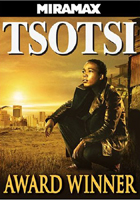 BUY IT AT AMAZON: CLICK HERE!
BUY IT AT AMAZON: CLICK HERE!
STUDIO: Miramax Home Entertainment
MSRP: $29.99
RATED: R
RUNNING TIME: 94 Minutes
SPECIAL FEATURES:
• Feature commentary w/ dir. Gavid Hood
• Deleted scenes w/ commentary
• Alternate endings w/ commentary
• Hood’s short film The Storekeeper w/ commentary
• Behind-the-scenes featurette
• Music video
The Pitch
"It’s Man on Fire in reverse!"
The Humans
Presley Chweneyagae, Terry Pheto.
The Nutshell
Tsotsi (Chweneyagae) is a small-time criminal,
the sort that pulls jobs to survive on the outskirts of
night, after a job goes wrong, he has a falling out with his gang and sets out
on a solo. He finds a middle-class mark in the city proper, shoots her, and
steals her car. As he makes a getaway, he hears a sound from the backseat.
Along with the car, it seems that Tsotsi has stolen an infant.
With that kind of setup, the film could go all
kinds of different directions. The course director Gavin Hood takes is one of
gritty selfishness, tempered by a growing human decency, as Tsotsi fumbles his
way toward redemption.
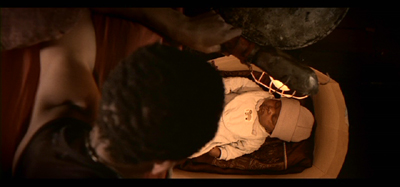
"Holy crow! We’ve struck a rich vein of baby!"
The Lowdown
2005 had a fine crop of Oscar contenders for Best
Foreign Language Film. Alongside the compelling, honest terrorist drama Paradise
Now, there was the Italian melodrama Don’t Tell, a couple
others I didn’t get the chance to see, and the eventual winner: Tsotsi.
I’m one of those types who thinks the 78th Academy Awards had an admirable
selection — better than most recent years — which means there was some
seriously heavy competition. I’m also one of those types who clings to the past
as if it were a lime.
In a field of such good quality, Tsotsi
was a deserving victor. More deserving than others? That’s debatable, but this
understated story of qualified redemption is a grimy gem worth digging for.
Its value isn’t apparent at first glance, because
of how seemingly blatant the plot and associated message are conveyed. The
script seems laden with truisms, both in dialogue and situation, such as the
existence of human poverty, suffering, and indomitable spirit. These things are
the sorts of familiar dramas that we encounter in our everyday lives, and not
just in our entertainment, which makes them seem doubly broad.
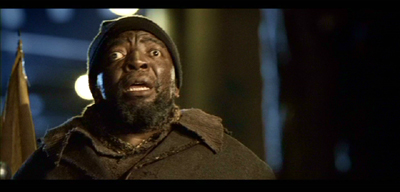
"Wall-eyed Pike?"
"Here, sir!"
If just taken at surface value, the movie would
be an effective but unsubtle one. Fortunately, there is an undercurrent, almost
a riptide of meaning layered beneath. The film is named after its protagonist
for good reason. It’s very focused not on the nature of these indecencies but
on Tsotsi’s personal reaction to them. The plot is simple, but the character is
complex. Tsotsi represents something like an individual’s concept of religion
within the tenets of an established church: difficult to define, prone to
diverge from the strict path, and profoundly meaningful.
I’ve never been very comfortable with critics
calling this actor or that a "revelation," because hyperbole lowers
the value of certain words, kinda like inflation does with money. I’ve also
never been more tempted to so contribute to the spiraling linguistic economy
than with first-time lead Presley Chweneyagae as Tsotsi. His character is
mostly speechless. His lines, when he does have them, are short, brusque,
almost monosyllabic. What he does with his eyes and silences is nothing short
of enthralling.
Director Gavin Hood found a perfect player in
Presley, because so many of the film’s key scenes take place in silence. Hood
shows a deft hand for creating tension without dialogue or clever editing.
Dramatic elements combine, frequently, to bring about long stretches of
hard-eyed stare-downs and ruinous confrontations. That this repeated motif
doesn’t get stale, despite being brought out several times, is a testament to the
storytelling and pacing of the script (adapted by Hood from a novel by Athol Fugard).
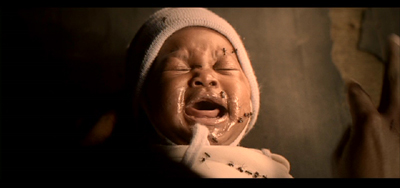
Did you know most ant-related deaths are caused by suffocation?
Diarrhea came in second.
One force that contributes to the strength of the
familiar story is the veiled arc. Rather than being entirely predictable, the
specifics of Tsotsi’s personal journey follow a unique path, though the wider
arc fires off and lands about where you’d expect it to, allowing for wind.
The conclusion of the film, in addition to being
the most refined of Hood’s several experiments in tension, is a neat
sidestepping of the curse of overt sentimentality. It actively resolves the
conflicts of the story, but does so without the sort of reductionist message
that is too prevalent in character dramas. By leaving out that potential
authorial intrusion, Hood maintains the character-centric focus of Tsotsi.
It is a story heavy in sentiment and emotion,
some of it raw and some of it sweet, but what elevates it above its peers is
the uncanny devotion to character that Chweneyagae demonstrates. Tsotsi
is, in my opinion, a great example of how to approach a story about the social
ills, no matter the country. Its emotions may be heavy-handed and as broad as
the
its sight is focused on a single point of clear reference and sympathy.
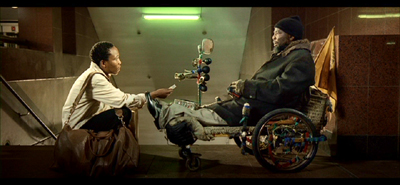
"Look, I loved you in Animal Crackers. Just take it, man."
The Package
Director Gavin Hood is a storyteller that doesn’t
mind revealing his secrets. All the bonus materials carry his eloquent, soft-spoken
voice. The feature commentary is wonderful and humble, playing up the talents
of his crew and cast. He’s fascinating to listen to, and rarely lets a moment
pass in silence. It’s the kind of enthusiastic commentary that justifies its
own existence.
Hood also contributes commentary to deleted
scenes and alternate endings. The deleted scenes don’t contribute much, but the
alternate endings are worth checking out. You know how alternate endings are
generally identical to the theatrical ending, except for, like, a different
camera angle included? Well, these ones are absolutely alternate, and Hood’s
reasons for chucking them are an education in restraint.
Hood also presents his twenty-two minute short
film, thematically similar to Tsotsi, called The Storekeeper. As with
everything else on the disc, you can watch it with Hood’s elucidating comments
or without.
There’s also a behind-the-scenes featurette and a
music video, which shows off some of the great fusion music that populates the
soundtrack. All in all, a great set of bonuses, with little dead weight.